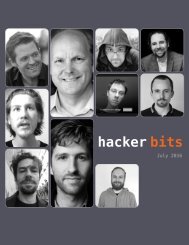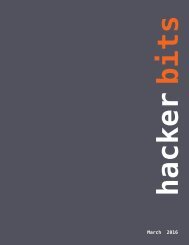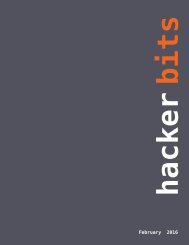Hacker Bits, April 2016
HACKER BITS is the monthly magazine that gives you the hottest technology and startup stories crowdsources by the readers of Hacker News. We select from the top voted stories for you and publish them in an easy-to-read magazine format. Get HACKER BITS delivered to your inbox every month! For more, visit http://hackerbits.com.
HACKER BITS is the monthly magazine that gives you the hottest technology and startup stories crowdsources by the readers of Hacker News. We select from the top voted stories for you and publish them in an easy-to-read magazine format.
Get HACKER BITS delivered to your inbox every month! For more, visit http://hackerbits.com.
Create successful ePaper yourself
Turn your PDF publications into a flip-book with our unique Google optimized e-Paper software.
similar to something you’ve<br />
seen, and you’ll know the answer.<br />
If that is not the case, it’s<br />
useful to think of what problems<br />
you’ve seen that are most similar,<br />
and bring these up with the<br />
interviewer. Most interview questions<br />
are slightly-obscured applications<br />
of classic CS algorithms.<br />
The interviewer will often guide<br />
you to this algorithm, but only if<br />
you begin the process.<br />
Finally, after both you and<br />
your interviewer agree that<br />
you have a good solution, you<br />
should write your code. Depending<br />
on the company, this may be<br />
on a computer or a whiteboard.<br />
question, the candidate is asked<br />
how he or she would design<br />
a complex real-world system.<br />
Examples include designing<br />
Google maps, designing a social<br />
network, or designing an API for<br />
a bank.<br />
The first observation is that<br />
answering system design questions<br />
requires some specific<br />
knowledge. Obviously no one<br />
actually expects you to design<br />
Google maps (that took a lot of<br />
people a long time). But they do<br />
expect you to have some insight<br />
into aspects of such a design.<br />
The good news is that these<br />
learn this is to read about how<br />
other engineers have used the<br />
concepts. The blog High Scalability<br />
is a great resource for<br />
this. It publishes detailed writeups<br />
of the back-end architecture<br />
at real companies. You can read<br />
about how every concept on the<br />
list above is used in real systems.<br />
Once you’ve done this reading,<br />
answering system design<br />
questions is a matter of process.<br />
Start at the highest level, and<br />
move downward. At each level,<br />
ask your interviewer for specifications<br />
(should you suggest<br />
a simple starting point, or talk<br />
...you may also encounter system design<br />
questions. Companies seem to like<br />
these especially for more experienced<br />
candidates.<br />
But because you’ve already<br />
come up with the solution, this<br />
should be fairly straightforward.<br />
For extra points, ask your interviewer<br />
if they would like you to<br />
write tests.<br />
4. Talk about tradeoffs<br />
Programming interviews are<br />
primarily made up of programming<br />
questions, and that is<br />
what I have talked about so far.<br />
However, you may also encounter<br />
system design questions.<br />
Companies seem to like these<br />
especially for more experienced<br />
candidates. In a system design<br />
questions usually focus on web<br />
backends, so you can make a<br />
lot of progress by reading about<br />
this area. An incomplete list of<br />
things to understand is:<br />
• HTTP (at the protocol level)<br />
• Databases (indexes, query<br />
planning)<br />
• CDNs<br />
• Caching (LRU cache, memcached,<br />
redis)<br />
• Load balancers<br />
• Distributed worker systems<br />
You need to understand<br />
these concepts. But more importantly,<br />
you need to understand<br />
how they fit together to form<br />
real systems. The best way to<br />
about what a mature system<br />
might look like?) and talk about<br />
several options (applying the<br />
ideas from your reading). Discussing<br />
tradeoffs in your design<br />
is key. Your interviewer cares<br />
less about whether your design<br />
is good in itself, and more about<br />
whether you are able to talk<br />
about the trade-offs (positives<br />
and negatives) of your decisions.<br />
Practice this.<br />
5. Highlight results<br />
The third type of question you<br />
may encounter is the experience<br />
question. This is where the interviewer<br />
asks you to talk about<br />
a programming project that<br />
hacker bits<br />
15















